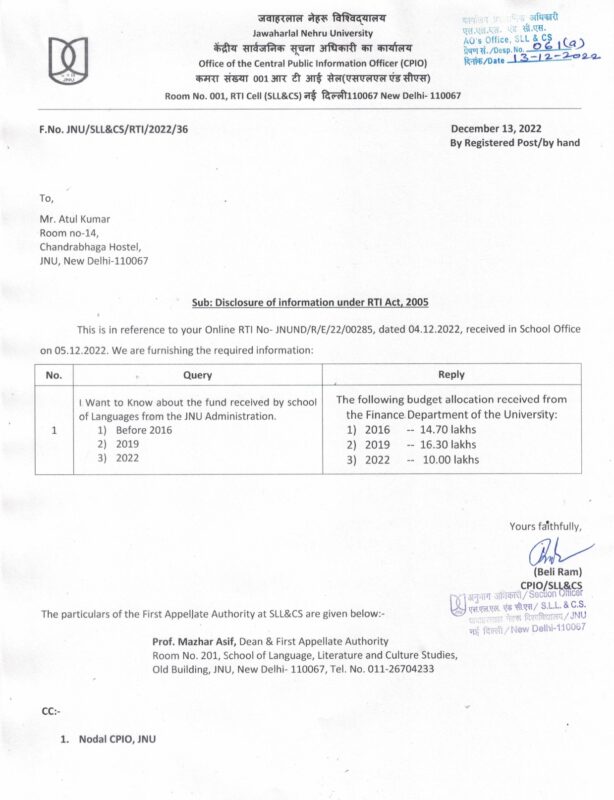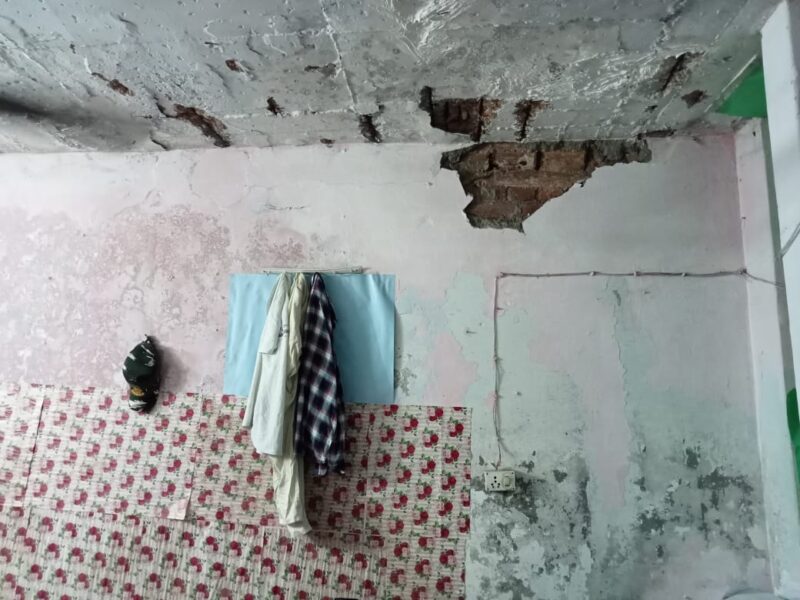Jawaharlal Nehru University (JNU), which has been a hub for students wanting to learn foreign languages, will soon introduce degree courses in Indian regional languages too. But the initiative hasn’t enthused university’s current students.
Santishree Dhulipudi Pandit, the university’s first female vice-chancellor, had announced recently that a special Centre for Indian Languages would be created on the JNU campus where Indian language courses will be offered 2023-24 academic year onwards.
However, students don’t seem to be enthusiastic about it. They say that JNU needs to set its house in order first before venturing into new projects.
Ganpat Chaudhary, 24, a master’s student in Spanish, told Patriot that the infrastructure in the classrooms of school of language, literature and culture studies, is in bad shape.
“Seats, benches and even projectors are damaged in some classrooms. When professors share video clips with students, we have to view them on our computers. In these circumstances, the administration intends to invest in regional language centres rather than addressing our current issues,” lamented Chaudhary.
“Students pay money but don’t get the services. We have a hostel with students of various courses staying in it. The price of B. Tech course at JNU is Rs 12 lakh approximately but what is the student getting after paying this amount? When the current courses are not being completed and students face problems, then what is the point of offering new courses?” wondered Chaudhary.
Last week, there was a strike on the campus by the Jawaharlal Nehru University Students’ Union (JNUSU).
“JNUSU had called for a protest because the university has asked M. Phil. and PhD students to vacate their hostels and deregister from their courses by December 31, 2022. The final year students were given a notice for this around six months ago, but the thing that amazes me is how come students who’ve lost around one and a half years because of the pandemic are expected to cover up their remaining work in six months?” asked Chaudhary.
While the vice-chancellor of the University did not respond to an e-mail query by Patriot, a member of the JNU administration said on condition of anonymity that the decision to include regional language is being taken to attract funds to the cash-strapped university.
“JNU is cash-strapped and has no way of earning money. Discussions are underway with various state governments on this,” added the official.
“There has been positive response. The Tamil Nadu government has already committed Rs 10 crore for the establishment of a Tamil chair in the centre. Aside from that, governments of Maharashtra, Assam, Karnataka, Puducherry and Odisha are also looking to set up their respective chairs,” said the official further.
“All of these will assist us in resolving our current issues and improving overall efficiency.”
While it may solve the financial crisis to an extent and even improve infrastructure in the university classes, there is no certainty that the quality of education will remain at par with the best, feel some students.
According to them, the focus is only money and not on research for which the university is known.
Atul Kumar, a B.A. student in Japanese language, said, “This decision is going to lower the quality of education in JNU because the motive of this step is to gain money and not promote education.”
He went on to explain that a further addition of courses, instead of improving the existing curriculum, will impact research.
“The quality of the research that the university is known for will decline rapidly. People will come here, stay for six months or even a year, get a degree for the sake of getting a degree, and then leave. This initiative is essentially a step towards commercialising education,” he reasoned.
Kumar recalled an incident. He had asked the administration about a fund received by the school of language, literature and culture studies from the administration under the RTI act, specifically asking about the total amount.
“I had to follow up several times to get an answer, and the response I received was not detailed,” he complained.
“According to what I was told, the budget for 2016 was Rs 14.30 lakh, Rs 16.30 lakh in 2019 and Rs 10 lakh in 2022. Normally, as inflation rises, one would expect allocated funds to rise or remain constant, benefitting students. However, they were reduced, with no explanation,” he added.

“Given the current situation of the school of languages, how do you believe that the regional language centres being set up will be successful?” he added further.
Some of the students feel that the initiative will take years to get implemented.
“This is just a heads-up. Implementation will most likely take years, and one thing is certain: there will be no discussions or updates shared with students,” said Mubarak Hussain, a 24-year-old student.
Hussain claimed that the administration has failed to provide basic amenities to current students.
Instead of announcing grandiose plans, they should focus on fixing those first, he felt.
Hussain went on to say that the hostel he is currently staying in needs repair work and is dangerous.
“It will be a miracle if the building survives the next two years, but no action has been taken,” he said.
“The existing courses are not being completed on time. Students are protesting and requesting for extra time, and the administration doesn’t even consider it. They refuse to even have a conversation about it,” Hussain added angrily.

Professor Santishree Dhulipudi Pandit had recently told a newspaper, Amar Ujala, in an interview, “A specific centre for Indian languages will be developed for this purpose. This is being discussed with several state administrations. Tamil Nadu government and Maharashtra government have promised Rs 10 crore each for the Tamil chair and Maratha chair at the university. JNU currently provides full graduate, postgraduate and PhD programmes. Under the guidelines of the National Education Policy 2020, e-learning skill oriented courses will be offered for the first time. Together with full-time degree studies, these will aid in employment, entrepreneurship, innovation, or starting your own business.”
Follow us on:
Instagram: instagram.com/thepatriot_in/
Twitter: twitter.com/Patriot_Delhi
Facebook: facebook.com/Thepatriotnewsindia





